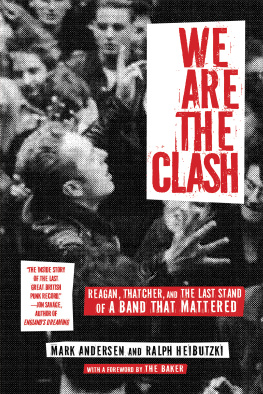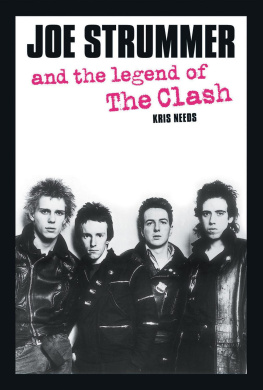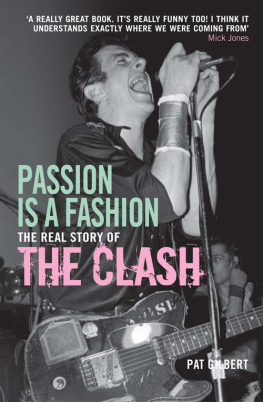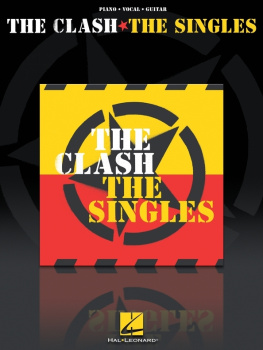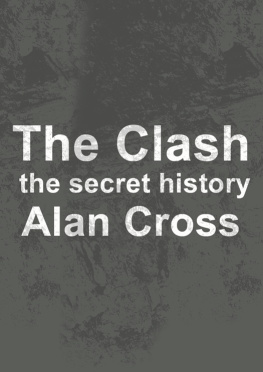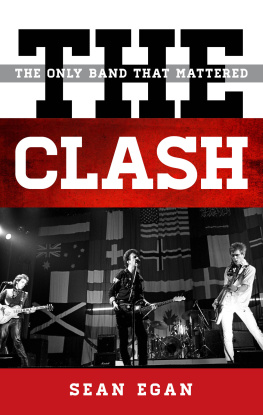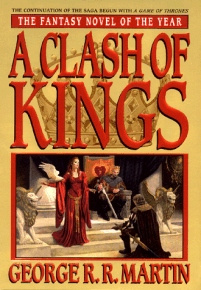
To my father Merlin and grandfather Otto, who were farmers, ranchers,
and coal miners; and to my mother Anna Margaret Vik.
To my son Soren, my daughter Sevgi, and
my beloved Tulin.
To Jess Arias and Martin Jenkinson, both gone too soon.
M.A.
To Budgie, my dear wife, Lisa D. Quinlan Heibutzki:
your inspiration, love, and support mean everything.
To Anthony Salazar (19652005):
yeah, you were right, it worked out for the best...
To Don Hargraves, Tim Easterday, and John Hilla:
the mission continues. Kick down the doors!
R.H.
So the forces gathered together
against the thorn a-piercing in their side
A brave new world is beckoning
so the olden world must die...
Old English folk ballad, c. 1986
foreword
jewels from the wreckage
by barry the baker auguste, loyal clash foot soldier, 19761983

The Baker in action, handing a restrung guitar to Joe Strummer midsong. (Photographer unknown.)
At long last, The Clashs final incarnation has been definitively chronicled. Mark Andersen and Ralph Heibutzki have brilliantly filled in the blanks of the Clash Mark II era, including its eventual implosion. And while set three decades ago, the political, social, and economic evils The Clash battled against then are just as relevant today, if not more so. Both Clash fans and general readers alike will be moved by this tale of onstage conquest and offstage turmoil, so deftly woven into the fabric of the charged politics of that time.
Although the seeds of discontent were sown long before, 1983 was The Clashs time of bitter harvest. By one measure, the year held the bands greatest triumphheadlining the first day of the US Festival, before 250,000 peoplebut also witnessed an astonishing act of self-immolation.
Joe Strummers DIY film noir Hell W10, shot in early 1983 when the band was on break, foreshadowed the tragedy. By the movies end, the villain, Mr. Socratesenthusiastically played by Mick Jonesand his empire are wiped out. By September, that would be the case in real life.
The irony is inescapable: Mick freely accepted the villains role, and would be thus portrayed to the press after his purge. This suggests Mick was a voluntary scapegoat; his expulsion was the purifying remedy for The Clashs maladies, just as that of Nick Topper Headon before him.
Mick was axed from the band in a scene plotted long in advance. Few knew it was going to happen. Although valid reasons for the dramatic act were apparent, it hit those close to the band like a death in the family; a killing, even, committed by brothers. There could be no neutral ground. Friends and acquaintances were forced to choose sides, and it would be years before many felt comfortable enough to associate socially or professionally again.
I know, because I lived it. I served alongside Joe, Mick, and Paul starting in the summer of 1976, hauling gear and doing whatever else needed to be done while still a teenager living at home. I signed on shortly after Bernie Rhodes assembled the band, was there when Topper joined in spring 1977, and witnessed Bernies dismissal in 1978 and his return in 1981, forming a fateful alliance with Kosmo Vinyl, who had become the bands ad hoc mouthpiece in the interim. Aside from the first show at the Black Swan in Sheffield, I was at every show, rehearsal, and recording session.
No one knows what we went through during those years marching up the hillonly us! As Joe once said, We went to hell and back! Words are inadequate; it is impossible to convey the anguish of endless months of touring; nonstop revolving hotel rooms; a different town every day; the months of monotony in studios with endless retakes and overdubs; brain-numbing repetition done out of duty and devotion. We had to turn into some kind of machine, or we would have gone mad. Or maybe we did... PTSD isnt confined to soldiers. But Id do it all over again, for such was The Clashs irrepressible sense of mission, a calling I embraced.
That level of dedication always comes at a cost, however. To maintain my own sanity, I ignored the excesses of rock and roll to single-mindedly focus on the equipment and work needed to enable the band to perform, record, and rehearse. I didnt waver from that purpose until September 1983, in a head-on collision of interband politics, personal resentments, managerial manipulation, and road-weary exhaustion.
Once reinstated in 1981, Bernie had set about reconstructing the band he had originally created, resurrecting his Stalinist regime from 1976, with Kosmos assistance. By 1982, the duo was pounding the table about all manner of band diktats, with Bernie barking the orders and Kosmo cracking the whip to keep everyone in line. From Toppers removal; the decision to support The Who and to play the US Festival; to the eventual firing of Mickthe two of them were relentless. Joe found himself caught in an escalating tug-of-war between the bands founding fathers, Bernie and Mick.
Bernie did help the band break through in America, but in the process ripped apart their very DNA. Mick became increasingly isolated, and scarcely helped his cause by acting the prima donna, at odds with the Clash anti-star ethos. The contradictions became inescapable: to prove a punk band from the squats of London could conquer the world, The Clash had to become the very thing they set out to destroy. In the end, it just proved too high a price to pay.
This was the unanswerable dilemma at the bands heart since its creation: how do you go to the top level of the music business and still stay trueand be seen to be trueto your ideals? As original drummer Terry Chimes had predicted, mass success called everything into question.
The dilemma was unbearable to Joe. In desperation, he adopted Bernies military platitudes about having to cut off the gangrenous limb in order to save the body, and how we all must be marching in the same direction.
It still confounds people today: how could Bernie even consider that he could fire both Topper and Mick and still have a band? I was one of those skeptics. Yet The Clash, in its purest form, was Bernie, and Bernie was a fundamental extension of them. His relationship with the band was so intimate and personal that, in the end, he would rather demolish it than see it become obsolete. Evolve or die! Tragically, he didnt see that there was more than one way to evolve.
When Mick was dismissed, I instinctively knew I was next for the chop. So I left of my own volition bearing no one any ill will. I had given The Clash more than seven years of my life and had worked as hard and as loyally as anyone could. But Id done my job and it was time to leave. Regime change required a total purge. I shook hands with Joe and Paul and said goodbye, quietly slipping down the stairs of Rehearsal Rehearsals for the last time.
Like the band, I had given it my alland then, suddenly, it was over and done. The rupture was painful and complete. After the end of my Clash story, I had no contact with any of my comrades for years, never saw The Clash Mark II perform, and never even heard anything off the album that was created... so total was my break with that scene and the people involved.
Eventually, I tried to piece together some of the fragments from my Clash years, but it was a profoundly difficult undertaking. I refused all interviews for over thirty years. Even when I finally decided to speak, I only wanted to contribute to Clash-related projects that would rise above the cheap name-calling and petty finger-pointing that inevitably rise in situations that have run their course. The endeavors needed to have genuine substance, be deeply researched, offer a different perspective, and, above all, exhibit the highest probity, integrity, and honesty.
Next page
